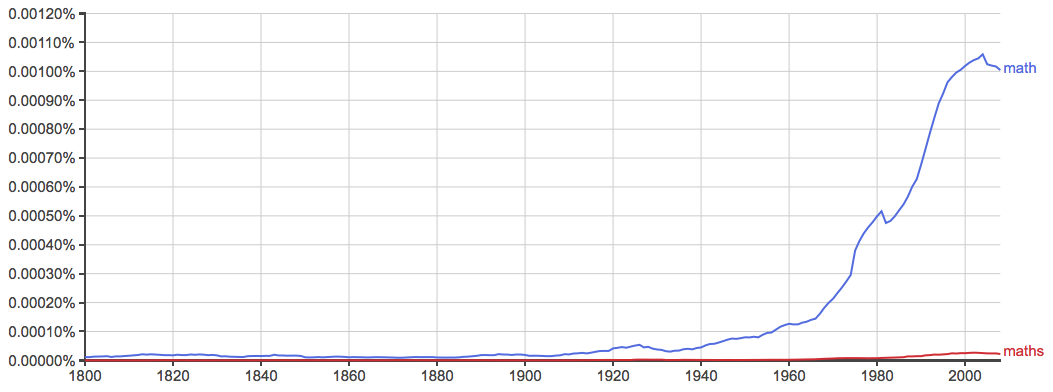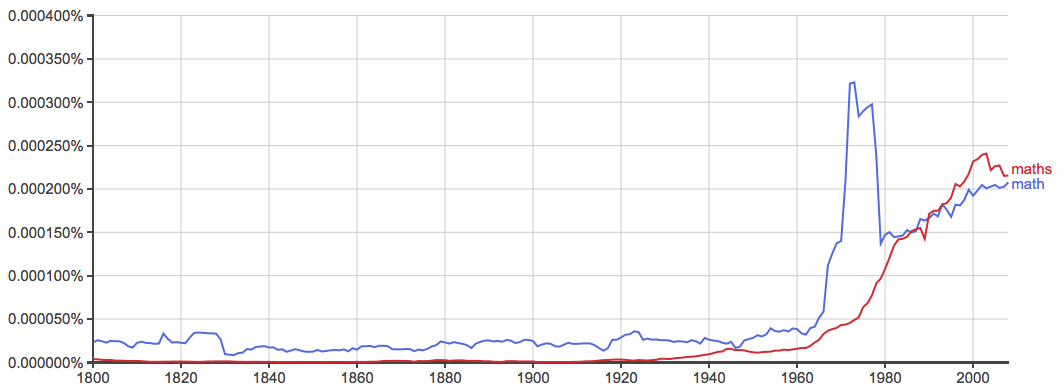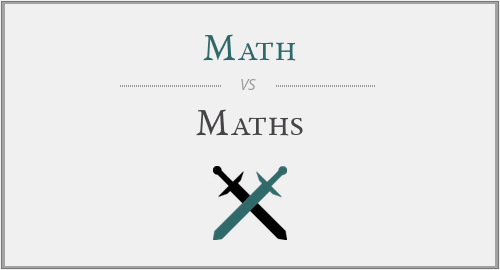Is “math” or “maths” the correct word to use as the shortened or colloquial form of the word mathematics? The answer is that it depends on where you are.
To North American speakers of English, the word to use is “math”, as in “I majored in math”, and “maths” would sound wrong. Speakers of British English, however, would always say “maths”, as in “I took a degree in maths”. They would never say “math”.
There are logical arguments for both spellings. The word “mathematics” can be considered as a singular and as a plural noun. Both the Oxford and the Merriam-Webster dictionaries say the word is plural – hence the s on the end – but also that it is usually used as if it was a singular noun. So, most people would say “mathematics is my best subject” and not “mathematics are my best subject”. The shortened form “maths”, then, makes sense because the word is still a plural noun and so should still have the “s” on the end. On the other hand, it could be argued, “math” makes sense because it seems wrong to remove the letters “ematic” from the middle of the word and leave the final “s”.
There are a number of other plural nouns that are used as if they were singular – for example economics, ethics, politics, gymnastics, measles and dominoes. These words, however, are not habitually shortened, making math/maths rather an unusual word.
It’s sometimes surprising how much argument and disagreement small differences such as that single letter can make. Readers in the UK, for example, sometimes get very upset if someone writes “math” rather than “maths”. No doubt the reverse is true in the US. In practice, it’s simply worth being aware of the geographical differences so that you can use the correct form of the word in your writing.
Other US/UK Differences
Of course, there are a lot of spelling differences between American English and British English – Colin took a look at the reasons behind this in An Englishman in New York – The Problem Of UK-US English in Freelance Writing.
But are there any other words like math/maths, where one version of English has an “s” at the end of the word, and the other doesn’t?
There is: a very popular building-bricks toy that, if you have children, you’re probably all too used to stepping on. It’s manufactured by a company called LEGO. How do you refer to a handful of those bricks?
In the US, you’d say “Please pick up your Legos.”
In the UK, you’d say, “Please pick up your Lego.” Note the lack of an “s”.
This is the reverse of the math/maths situation, where US English has the “s” tagged onto the end of the word and UK English lacks it.
So who’s right?
Neither!
The correct plural, according to LEGO, is “LEGO bricks” or “LEGO sets”. (Note the capitalization, too.) So instead of saying “Pick up your Legos” you should say, “Pick up your LEGO bricks.”
Here are a couple of examples of “Lego” and “Legos” in use in different publications:
A robot that can build small models from Lego may be a breakthrough for automated manufacturing – if it can stop dropping bricks.
(BBC News – British publication)
The building blocks known as Legos have long been beloved toys. But did you know the name actually has a strategic meaning behind it?
(Huffington Post – American publication)
Further Reading About American English and British English
If you’re interested in finding out more about the differences between American English and British English, check out these resources on Daily Writing Tips:
7 British English Writing Resources, Mark Nichols – this post rounds up a bunch of style guides and copy editing handbooks that writers working for British publications should find helpful
One “L” or Two?, Maeve Maddox – there are a lot of words that can take an “ll” or an “l” depending on whether you’re writing for a UK or a US audience. Maeve lists some common ones and explains the general rule to follow.
Worshiping and Kidnapping, Maeve Maddox – should you add an extra “p” when adding an “ing” to words like “worship” and “kidnap”? It depends! Maeve outlines the issue here.
Program vs. Programme, Ali Hale – both British and American English use “program” when talking about computers, but British English uses “programme” for many other areas (e.g. a “programme of study”). This post explains the difference, and how to use “program” as a verb.
Punctuation Errors: American and British Quotation Marks, Daniel Scocco – while both American and British English use punctuation marks in a broadly similar way, there’s a key difference when it comes to punctuation and quotation marks. Daniel explains it here.
By any name, writers as a group have encountered no enemy quite so intractable as the enemy of mathematics. Writers don’t understand numbers. We don’t trust them. Nonetheless, mathematics is part of life, and we must learn to accept the things we can’t change.
As if the numbers themselves weren’t confusing enough, there are two ways to shorten mathematics—as math and as maths. Luckily, we writers like words, and we can handle simple dilemmas such as this one.
Both of these terms are correct. If you don’t know when to choose math or maths, you aren’t alone. Continue reading to discover the proper usage cases for each of these words.
What is the Difference Between Math and Maths?
In this article, I will compare math vs. maths. I will use each of these spellings in at least one example sentence, so you can see them in context.
Plus, I will show you a useful mnemonic that will help you next time you need to choose either maths or math.
When to Use Math

Here are a few examples of math used in sentences.
- I have math homework to do, but I would rather do something else.
- Early intervention for math should target either procedural fluency or conceptual understanding.
- “We throw away a banana for every buck we take, so no one finds out,” Maebe said, to which T-Bone replied, “I think you should do that math again.”
- But reading and math scores were essentially flat on the most recent Nation’s Report Card, a measure of student achievement. –The Wall Street Journal
Math is the predominant form of this word in American English.
As you can see in the above chart, math is the clear winner in American English.
When to Use Maths

It is common to see maths is British publications.
Osborne said schools in the north should aim to raise attainment at 16 in English and maths to be at least the national average, and that he wanted the north to be regarded as a leading European region in digital skills at 16. –The Guardian
Interestingly, the British have preferred math for most of the 19th and 20th centuries, culminating in a prominent spike in usage around 1970, before maths overtook it.
Trick to Remember the Difference
Math and maths are the standard forms of this word in American and British English, respectively.
Luckily, there is a very easy way to remember maths vs. math. Maths ends in the letter S, just like the river Thames in England. If you can link this bit of British geography to the British word maths, you should have no trouble remembering the usage cases for these variants.
Summary
Is it math or maths? Both maths and math are shortened forms of the word mathematics, which is the study of number, quantity, and space.
- Math is the American variant.
- Maths is the British variant.
Since maths and Thames both end with an -s, you should have little trouble remembering when to use maths.
Math is difficult, but even if you don’t understand mathematics, you can be sure you’re using the correct word when you write about it.
Contents
- 1 What is the Difference Between Math and Maths?
- 2 When to Use Math
- 3 When to Use Maths
- 4 Trick to Remember the Difference
- 5 Summary
If you ever got into contact with the word «mathematics», you have certainly also seen at least one of the nouns from the pair «math» and «maths». But which one is correct? How do you spell it shortly, «math» or «maths»? Let’s take a quick look upon this linguistic confusion to make sure you get it right.
Math vs. Maths
Both «math» and «maths» are abbreviations for the word «mathematics», the complex science that studies numbers and shapes. We can’t claim that any of these abbreviated forms is right or wrong, because they are just shorter versions for the full noun («mathematics»). Whether you prefer adding the last «s» or not is a matter of personal choice and culture, according to how you’ve been educated in school and how you have seen it spelled more frequently.
There are, anyway, some statistics that show how often «math» and «maths» are used. It turns out that, just as it happens for other pairs of words that differ through only one letter, the frequency of use regarding the different abbreviations differs from British to Americans. Here’s how:
When do we use «maths»?
«Maths» is the abbreviation preferred by the British. In the UK, they say that «mathematics» ends in «s» and so should its short form. It’s more likely that if you ask a British person, they would tell you they prefer «maths» as they have seen it spelled like this all the time.
When do we use «math»?
«Math» is preferred by the Americans, not only because they usually go for the shorter forms, but also because they consider «mathematics» is a mass noun that takes singular verbs and should, therefore, be abbreviated without the «s» in the end.
Conclusion
«Math» and «maths» are not complete words on their own and. As abbreviations, they can’t be considered wrong or right. Choosing a form will be partially influenced by your personal choice and logic, and partially by the region where you’ve learned to spell it. British use «maths» more often and Americans prefer «math», but this does not define any rule for correct spelling.
Asked
12 years, 8 months ago
Viewed
9k times
Which one is considered correct? I say «math», however I believe I heard somewhere that «maths» is correct. Also, should it (and «mathematics») be capitalized or not?
Daniel
57.1k75 gold badges256 silver badges377 bronze badges
asked Aug 16, 2010 at 0:35
0
This is simple:
- Math is American English.
- Maths is British English.
It is a common noun and should only be capitalized at the beginning of a sentence.
answered Aug 16, 2010 at 0:37
nohat♦nohat
67.7k12 gold badges197 silver badges241 bronze badges
7
This is meant to be added to nohat’s response but I can’t seem to add comments (yet).
The words «math» and «maths» are both abbreviations of «mathematics» and are dictated by your local variation of English.
answered Aug 16, 2010 at 1:15
soutarmsoutarm
1,4534 gold badges14 silver badges18 bronze badges
-
#1
Mr Brown teaches maths/biology/geography?
Mr Brown teaches Maths/Biology/Geography?
I have found out that some people capitalize school subjects, others don’t. Which of the two versions do you see more often / do you prefer?
-
#2
I wouldn’t capitalize them here in this sentence.
-
#3
As always, it depends on context. The subject of a class can sometimes be the proper name of a class. In that case, it would be correct to capitalize it. Most schools have several classes in mathematics. The names of the classes are Algebra 1, Algebra 2, Geometry, … not Mathematics so Mr Brown teaches mathematics. A school might have only one class in geography and the name of the class is Geography. Mr Brown teaches Geography (the class). Mr Brown teaches geography (the subject).
-
#4
I wouldn’t capitalize them here in this sentence.
Thanks.
-
#5
As always, it depends on context. The subject of a class can sometimes be the proper name of a class. In that case, it would be correct to capitalize it. Most schools have several classes in mathematics. The names of the classes are Algebra 1, Algebra 2, Geometry, … not Mathematics so Mr Brown teaches mathematics. A school might have only one class in geography and the name of the class is Geography. Mr Brown teaches Geography (the class). Mr Brown teaches geography (the subject).
Thank you for your detailed reply. That solves the matter.
-
#6
As always, it depends on context. The subject of a class can sometimes be the proper name of a class. In that case, it would be correct to capitalize it. Most schools have several classes in mathematics. The names of the classes are Algebra 1, Algebra 2, Geometry, … not Mathematics so Mr Brown teaches mathematics. A school might have only one class in geography and the name of the class is Geography. Mr Brown teaches Geography (the class). Mr Brown teaches geography (the subject).
That’s how I see it too, but I’m not convinced that everyone would make that distinction.
-
#7
That’s how I see it too, but I’m not convinced that everyone would make that distinction.
![Wink ;) ;)]()
I would. Of course, I’m not everybody.
-
#8
Note: in the US (AE) we call the subject mathematics «math», not «maths».
-
#9
It should be ‘Mr Brown teaches maths/biology/geography. In this case, we’re only referring to the subject(maths).
For the capitalised one, ‘Mr Brown is a Maths teacher’. Now, we’re talking about the teacher himself(Maths teacher) and not only about the subject(maths, which is a common word and shouldn’t be capitalised)




